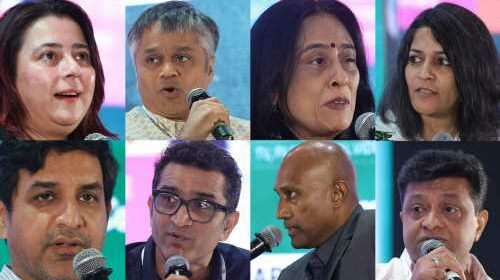Indian Media Industry Heavyweights Mull Abandoning Formulas, Future of Content

A galaxy of senior Indian content creators shared their insights on burning topics dominating the local landscape.
They were speaking at at Indiantelevision.com’s annual industry event, The Content Hub, in Mumbai on Tuesday.
At the Content Creation: No More Formulas panel, Shobha Sant, head of content alliances at Jio Studios, broke down the process behind the selection of its 100-title slate. Sant said that the selection was the result of five years of very a definite plan in terms of understanding audience segmentation and what people are watching.
“We have a mix of genres that cater to, we’d like to think, most audiences. The idea was that they are reaching out to the length and breadth of this country, which is very diverse,” Sant said.
Srishti Behl, CEO, Phantom Studios, and former director, international original film at Netflix India, said that the advent of streamers has ensured that content need not be produced for the masses or homogenized any more. “You don’t need everybody to see everything at the same time,” Behl said.
Abhimanyu Singh, CEO, Contiloe Pictures, said that the days of producing thousands of episodes for television in order to achieve economies of scale were diminishing. Singh said that Contiloe’s hit historical show “Taj: Divided by Blood,” produced for streamer ZEE5, was initially planned as 12 episodes five years ago, but was reduced to 10 due to shorter attention spans. “There’s change happening. And its rapid. Audiences have, I wouldn’t say changed, but evolved,” Singh said.
On the non-fiction side of things, Aradhana Bhola, managing director, Fremantle India, said that dating reality shows are going to be popular locally, citing the global success of Netflix’s “Too Hot to Handle,” produced by Fremantle’s Talkback, as an example.
Looking to the future, Neeraj Vyas, business head at Sony Max, said that currently there is a lot of sameness in television content and only a few producers have a commitment to differentiated content. Sony’s idea is to work with only those producers who believe in the cause of good content. “We cannot work with producers who see content as projects anymore,” Vyas said.
Sunder Aaron, whose Locomotive Global produced hit Netflix show “Rana Naidu,” the Indian adaptation of “Ray Donovan,” added: “When you see capital, again, flying around the world looking for emerging market opportunities, India is going to be where that money comes in. It may not be this year, but it’s definitely going to be next year or maybe 2025. We’re going to have a huge boom here. And we have to be ready to take advantage of that.”
At a subsequent panel specifically addressing the future of content, Ajit Andhare, COO, Viacom18 Motion Pictures, said that India has gone from being a market with a content deficit to one with a surplus. The biggest challenge for the consumer is that of finding enough viewing time.
“For the first time in India, our content is not competing with content, it is competing with other physiological needs,” Andhare said. “There is clearly a new equilibrium that we need to find. And we have a huge, huge surplus and we don’t have the time to cope with it.”
Ajit Thakur, CEO of streamer Aha, said that the 15-year-olds of today are what made him nervous. They are not interested in 10-hour series or two and a half hour films, but in gaming, he said. “When that 15-year-old kid becomes 25, the kind of content they will consume will be very different,” Thakur said. “If we get more diverse, and if we make it in the right price, I think the demand for content is not going anywhere.”
Shariq Patel, chief business officer, Zee Studios, concurred on the need for an affordable price point and added that the content world currently was a jungle rather than a garden and the trick is to plant a banyan tree that would live for a long time and provide shade.
Aashish Singh, formerly with Yash Raj Films and Netflix and currently producer, Lyca Productions (“Ponniyin Selvan: 1”), and “Bajrangi Bhaijaan” producer Amar Butala both stressed the need to bring back heroism into mainstream Bollywood.
“We have a lot of stories to tell, don’t ape the West,” Singh said. “Play with your characters, play with your culture… the world is out there wanting to watch.”
Read More About:
Source: Read Full Article